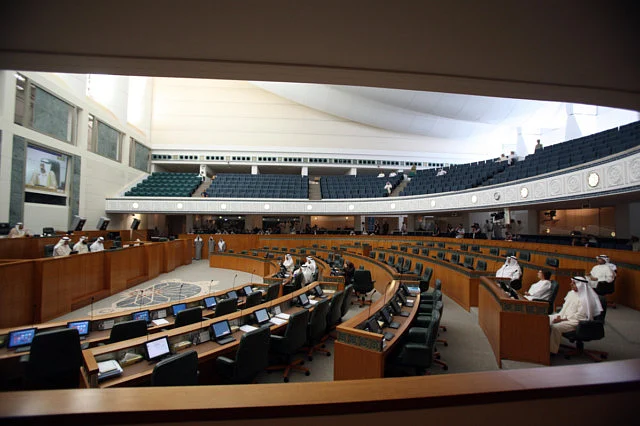Manama: Kuwait’s Supreme Court has unseated two lawmakers in a historic ruling that overturns a decision by the parliament to keep the membership of MPs sentenced to jail terms.
The court, with verdicts that cannot be challenged in any way, said that MPs Waleed Al Tabtabaei and Jamaan Al Harbash could not benefit from the parliament’s decision and had therefore to spend their sentences in jail.
The two MPs, currently out of Kuwait, were among a group of 67 defendants that included 10 former and sitting lawmakers who stormed the parliament building in November 2011 during a rally calling for the resignation or removal of then Prime Minister Shaikh Nasser Al Mohammad.
The incident, unprecedented in Kuwait’s history, was labelled “Black Wednesday” and caused uproar in the country. The suspects insisted they acted “without malicious intention”.
The case remained pending until December 2013 when the Criminal Court acquitted all suspects.
However, the Court of Appeals in November 2017 rejected the ruling, and sentenced the defendants to jail terms ranging from one to nine years.
Al Tabtabai and Al Harbash were sentenced to seven years each. The verdict was confirmed by the Cassation Court, the highest court in the country, in May.
However, the parliament in October and under the umbrella of Article 16 of its bylaws and after a heated debate among its members voted to keep the membership of the two lawmakers.
The case was referred to the Constitutional Court which on Wednesday said that Article 16 was unconstitutional, annulling the parliament’s decision and ordering the two lawmakers to serve their prison terms.
The judges argued that Article 16 made court rulings “hostage” to the will of the parliament and amounted to blatant interference in legal instances and a violation of the principle of separation of powers.
The legislative branch cannot interfere in the work assigned by the Constitution to the judiciary or violate court rulings or undermine their right or independence, they said.
“Lawmakers are not above or beyond the law. Immunity is not a privilege, but is part of public interest. Lawmakers have no more rights than any other Kuwaiti to comply with the law. The law must take its natural course for all people without discrimination and the lawmakers’ immunity is not intended to confront decisions, nor is it a means of breaking the law with impunity,” they said.
The Constitutional Court ruling was hailed as a victory for justice by several lawmakers while criticised as an attempt to decimate the powers of the parliament by others.
Speaker Marzouq Al Ghanem said he would comment only after receiving the ruling officially and reading carefully its details.
MP Ahmad Al Fadhl hailed the ruling as a breakthrough that should engraved with gold, especially when it highlighted that immunity did not mean rising above the law and dodging court sentences.
“Unfortunately, several lawmakers have gone on ego trips that made them believe they were the state. This ruling brings matters back into their framework. They are gone while the state remains,” he said.
Lawmaker Riyadh Al Adasani said he felt vindicated by the ruling since he refused to vote under Article 16 of the parliament’s statute, claiming that the process was not constitutional.
At the other end of the spectrum, Al Harbash said that the consequences of the ruling “reached beyond two lawmakers to encompass the legislative institution as a whole.”
“The highest power should be that of the parliament since it is the source of all powers,” he said.
Al Tbatabaei seemed more resilient, saying that “maybe there is goodness in such a ruling.”
MP Al Hamidi Al Subai said that unseating the two lawmakers was a “terrible development” that did not allow the parliament to exercise its full rights.
MP Mohammad Al Dallal said the ruling was unconstitutional and charged the Constitutional Court of causing a legal controversy.
Under Kuwait’s election rules, by-elections will be held to elect the two new candidates who will replace Al Tabtabaei and Al Harbash until the end of the current legislative term.
Sign up for the Daily Briefing
Get the latest news and updates straight to your inbox
Network Links
GN StoreDownload our app
© Al Nisr Publishing LLC 2026. All rights reserved.
